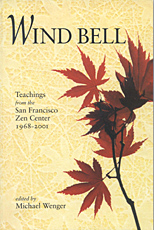Wind Bell started on December 2, 1961, as a one-page newsletter with reprints of talks by Suzuki Roshi, the founder of the San Francisco Zen Center. As the center expanded to include the Tassajara Center and Green Gulch Farm, so did the newsletter. Michael Wenger, Dean of Buddhist Studies, took over its editorship in 1984 and began publishing it twice a year.
This excellent and illuminating anthology contains teachings from the San Francisco Zen Center between 1968 and 2001. The material is organized into five thematic sections: the Suzuki Roshi lectures; material from Zen Center teachers, including Richard Baker and Yvonne Rand; pieces by visiting teachers such as Robert Thurman and Thich Nhat Hanh; explanations of traditional practices; and talks on everyday Zen covering such topics as how to relate this practice to creativity, parenting, and psychotherapy.
One of the teachings of Buddhism that always stirs us is not-knowing. In a talk, Blanche Hartman salutes the openings and freshness of beginner's mind. She then quotes a mantra that puts this into motion: "Please do not get caught in that place where you think you know." Letting go of opinions and fixed ideas brings a lightness to our being.
Linda Ruth Cutts in a talk on "Acedia and the Good Friend" points out that in traditional Buddhist literature it is said that a person who has a hateful temperament also has access to wisdom: "The hate type and the wisdom type are the same person except one way is unprofitable, the other profitable, one way unbeneficial, the other beneficial. The hate type, when it transforms, becomes wisdom; hate has the possibility of transforming into wisdom." For all of us who have a propensity toward this behavior, it is healing to know that it can be transformed. One antidote is friendliness. The important point made here: Nothing needs to be thrown out — it can all serve as grist for the mill.
